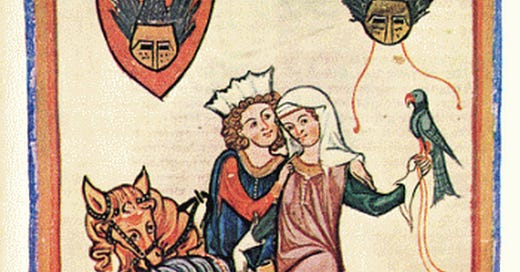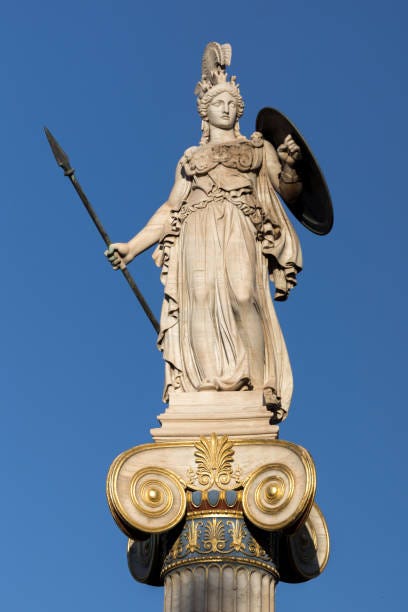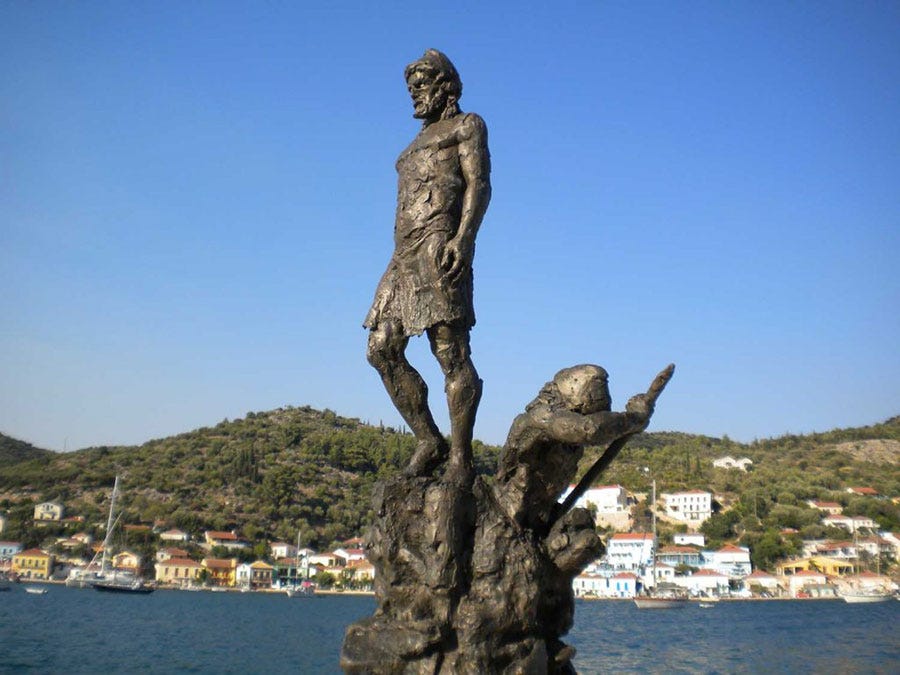Welcome back!
Taking a quick break from The Canterbury Tales, we’re going to take a look at the first book of Chaucer’s Troilus and Criseyde, which has been called his “masterwork.” Sprawling over eight thousand lines and set during the Trojan War, Troilus and Criseyde has the first use of “tragedye,” which many use to credit Chaucer with the tragedy genre itself in English. This work has had my interest piqued from the start since, if you read my introduction, you’ll know I’ve been fascinated with the use of Greek mythology and motifs throughout Chaucer’s works. The Norton Chaucer’s introduction to Troilus and Criseyde states it takes the typical form of a medieval romance and places it during the Fall of Troy. Reader, consider me intrigued. Let’s get into it.
The Prologue for Book One helps set the scene for us, where the narrator calls upon Tisiphone, one of the Greek Furies, to help him air out the lover’s complaint concerning their unfortunate fates. The entire prologue has a tinge of sorrow to it, so if the tragedy note from earlier didn’t give us some foreshadowing that this isn’t going to end well, our narrator surely sets this idea in stone. It feels reminiscent of the use of a Chorus in Greek tragedies, like Madea or Oedipus Rex, or of the General Prologue in Chaucer’s own Canterbury Tales, to help readers get a full grasp of the setting and situation at hand.
Book One then introduces us to Calachas, a seer and the father of Criseyde, and how he defects to the Greek camp after foreseeing their victory over Troy. We are then introduced to Troilus, who mocks the triviality of Love before seeing Criseyde for the first time and becomes lovestruck instantly (not too far from our afore discussed knights in The Knight’s Tale with Emelye). The scene before the fateful sighting is set in lines 155-168:
And so bifel, whan comen was the time
Of Aperil, whan clothed is the mede
With newe greene of lusty Veer the prime,
And swote smellen floures white and rede,
In sondry wises shewed, as I rede,
The folk of Troye hir observances olde,
Palladiones feeste for to holde.
And to the temple in al hir beste wise
In general ther wente many a wight,
To herknen of Palladion the servise;
And namely, so many a lusty knight,
So many a lady fressh and maiden bright,
Ful wel arrayed, bothe moste, mene and leeste,
Ye, bothe for the seson and the feeste.
“Bothe moste, mene, and leeste,” meaning everyone of all classes, is going to the Palladium to observe a feast or festival. Palladiones/Palladium here is referring to a wooden statue of Pallas Athena, which most readers will know is the Greek goddess of warfare and wisdom. I want to really zone in here for just a moment, because this feels like an important note for Criseyde in particular.
In The Knight’s Tale, Arcite, Palamon, and Emelye pray to three different gods or goddesses–Mars, Venus, and Diane, respectively–which is viewed by readers as their intentions towards the fight surrounding the romance of the tale. Arcite is after victory in battle, Palamon desires Love’s blessing, and Emelye wishes to preserve her maidenhood. Criseyde going to Athena’s temple in this setting may seem like just duty since everyone else is there for a feast, but I think this could be a sneak peek into her character.
Athena, as I mentioned earlier, is the goddess of warfare and wisdom, but we may need the reminder that Greek wisdom (at least in the case of Athena) isn’t the lofty, Solomon-esque guidance we usually think of. Athena’s mother (swallowed by Zeus while she was pregnant, which is another issue for another day) is Metis, whose very name means craftiness or cunning. Think more towards street smart, clever, outwitting your opponents…which is, arguably, another kind of wisdom. To really drive this point home, think with me on one of the most famous Greek heroes who is favored by Athena, and would technically be in the Greek camp in our tale, since this is during the Trojan War.
If you guessed Odysseus, well done! All literature that mentions Odysseus illustrates him as wise, yes, but in strategy and outsmarting his enemies. Don’t forget, he is the one who comes up with the Trojan Horse, effectively orchestrating the fall of Troy.
Do I think Criseyde is a battle strategist in disguise? No, but I do think her connection to Athena early on could be a good indication of her character. She is described as very beautiful (as most maidens are), but I think we as readers should keep an eye out for her being clever and strategic as well. Thus far, Chaucer hasn’t struck me as one to have a detail there just to have it. I will definitely be looking closer at Criseyde myself as we read on.
What are your first impressions of Troilus and Criseyde? Do you think the detail of visiting Athena’s temple is just coincidence, or should we be digging deeper? Let me know what you think!
Until next time!







I love how you pointed out the connection of the visit to Athena's temple! With such a brilliant mind that Chaucer had, I definitely think that every detail, no matter how seemingly inconsequential, is massively important to the overall plot. These small details would also be so significant to Chaucer's contemporary audience, as they would have had a better knowledge of those stories than modern readers do. I love how Chaucer focuses in on retelling , modifying, or simply incorporating so many Greek myths into his writings; those stories are so good, they deserve to be told again and again, even into modern retellings such as Percy Jackson.
This is a really interesting take! I agree with you when you said that Chaucer doesn't just include things for fun; everything has a meaning. I think Criseyde is definitely going to be an interesting character to look out for during the next few readings. I like how your knowledge of Greek mythology helps you look deeper into the texts meaning. I know very little about that subject, so it is interesting to hear it from your point of view. I also would like to mention the similarities between love in this piece versus others, like the Knight's Tale. The way in which Chaucer differentiates love in all of his poems seems quite significant.